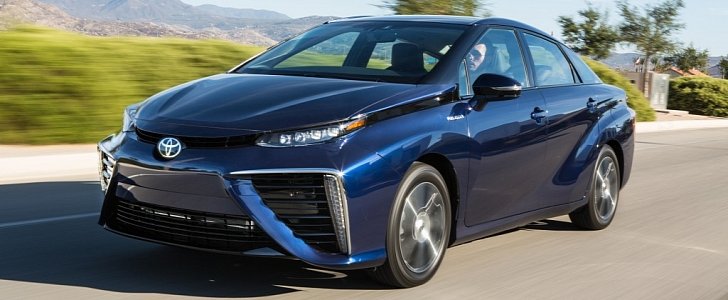Try to think of a brand that doesn't plan to release a battery-powered vehicle over the next few years, and you'll probably find a few. Now add hybrids into the equation and you'll be left scratching your head as even luxury and sporty brands have embraced the benefits of having the help of an electric motor or two.
Now do the same with vehicles powered by a liquid hydrogen fuel cell. You'll probably strat off strong with the likes of Toyota and Honda, and then quickly remembering that Hyundai has also gone on this path, but after these three you'll be back at rubbing your finger against your scalp.
The number of carmakers that are currently pouring time and money in developing battery-powered EVs is much greater than that of those invested in using fuel cells. And we're not talking about fringe brands that nobody has heard of: Volkswagen and Mercedes-Benz are the biggest names to have dedicated their efforts to bringing BEVs to the market.
Based on this evidence, you'd think the direction the industry is going in is pretty clear. To make matters even more obvious, even die-hard promoters of the fuel cell solution such as Toyota have now changed course and are considering giving batteries a go.
Despite all this factual evidence, the top brass of the automotive industry is thinking something completely different. Based on the findings in KPMG's 2017 Global Automotive Executive Survey, it seems that 62 percent of the execs questioned believe that battery-powered EVs will fail due to infrastructure problems (22% absolutely agree, 40% partly agree).
An even larger percentage of them - 78% - feel that electric vehicles that get their power from a liquid hydrogen fuel cell are the real answer that will prevail in the future. These numbers, together with what we've established at the beginning, beg the question: why are they steering their companies in a direction they feel is destined to fail?
The biggest differentiator between the two solutions is the infrastructure. While FCEVs have the advantage of relatively fast refueling times, they also require new facilities for extracting the hydrogen out of water as well as the vehicles to transport the liquid hydrogen to the refueling stations.
BEVs, on the other hand, are currently plagued with longer recharge times, but since the power grid is already present in every corner of the civilized world, building charging stations would be a much simpler and less costly affair. Besides, you only really need to recharge at a station on longer trips, since for day-to-day driving, the vehicle gets plugged in every night at home.
Plans for ultra-fast charging systems are already in place in Europe, while Tesla also announced it would be introducing the Supercharger 2 shortly. These will be able to offer at least 350 kW of charging power, meaning even the current EV with the largest battery capacity would recharge completely in no more than 20 or 25 minutes. With nearly 400 miles of subsequent range, a 20-minute break is more than welcome.
The infrastructure argument doesn't hold water. If this is truly what the automotive executives believe, either they know something we don't, or they are simply misinformed or ill-intentioned, preferring not to change the current supremacy of the internal combustion engine.
The number of carmakers that are currently pouring time and money in developing battery-powered EVs is much greater than that of those invested in using fuel cells. And we're not talking about fringe brands that nobody has heard of: Volkswagen and Mercedes-Benz are the biggest names to have dedicated their efforts to bringing BEVs to the market.
Based on this evidence, you'd think the direction the industry is going in is pretty clear. To make matters even more obvious, even die-hard promoters of the fuel cell solution such as Toyota have now changed course and are considering giving batteries a go.
Despite all this factual evidence, the top brass of the automotive industry is thinking something completely different. Based on the findings in KPMG's 2017 Global Automotive Executive Survey, it seems that 62 percent of the execs questioned believe that battery-powered EVs will fail due to infrastructure problems (22% absolutely agree, 40% partly agree).
An even larger percentage of them - 78% - feel that electric vehicles that get their power from a liquid hydrogen fuel cell are the real answer that will prevail in the future. These numbers, together with what we've established at the beginning, beg the question: why are they steering their companies in a direction they feel is destined to fail?
The biggest differentiator between the two solutions is the infrastructure. While FCEVs have the advantage of relatively fast refueling times, they also require new facilities for extracting the hydrogen out of water as well as the vehicles to transport the liquid hydrogen to the refueling stations.
BEVs, on the other hand, are currently plagued with longer recharge times, but since the power grid is already present in every corner of the civilized world, building charging stations would be a much simpler and less costly affair. Besides, you only really need to recharge at a station on longer trips, since for day-to-day driving, the vehicle gets plugged in every night at home.
Plans for ultra-fast charging systems are already in place in Europe, while Tesla also announced it would be introducing the Supercharger 2 shortly. These will be able to offer at least 350 kW of charging power, meaning even the current EV with the largest battery capacity would recharge completely in no more than 20 or 25 minutes. With nearly 400 miles of subsequent range, a 20-minute break is more than welcome.
The infrastructure argument doesn't hold water. If this is truly what the automotive executives believe, either they know something we don't, or they are simply misinformed or ill-intentioned, preferring not to change the current supremacy of the internal combustion engine.

